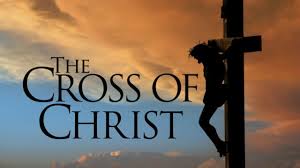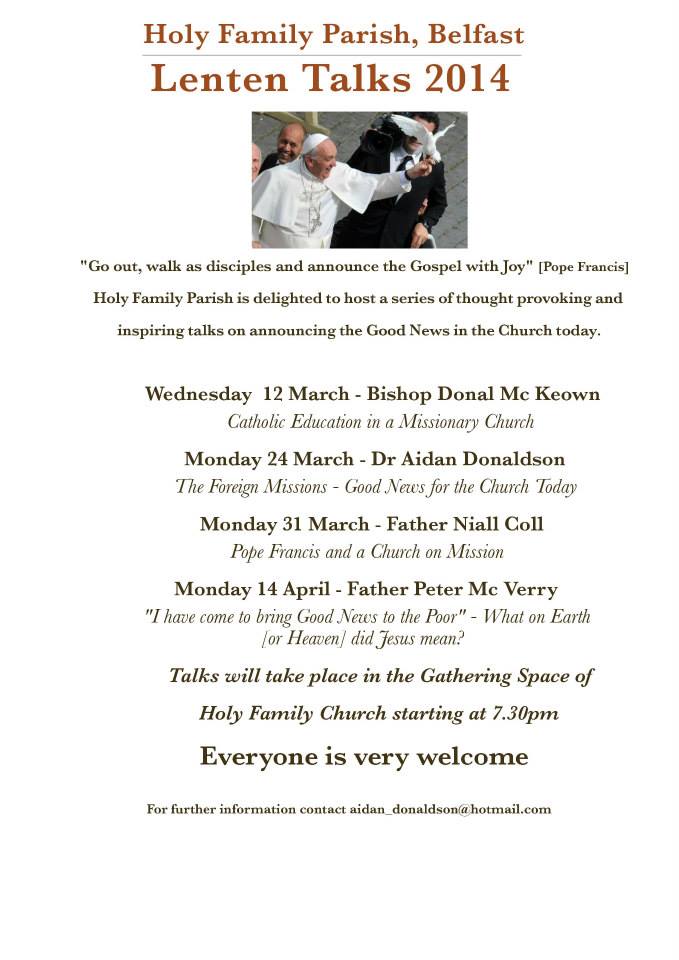Readings for Wednesday 12 March 2014 (First Week of Lent)
Jon 3:1-10. Ps 50:3-4, 12-13, 18-19, R/ v 19. Lk 11:29-32. www.catholicbishops.ie/readings
In Lent our eyes are fixed on the Cross of Christ from which comes our salvation, and the grace to accept it.
Pope Francis on Twitter
“Lent is a good time for sacrificing. Let us deny ourselves something every day to help others.”
Excerpt from Pope Francis’ Daily Meditations during Mass in the Chapel of the Domus Sanctae Marthae
“There are people who know how to suffer with a smile and keep “the joy of faith” despite trials and illnesses. These are the people who “carry the Church forward with their every day sanctity”, becoming true reference points “in our parishes and in our institutions”. Pope Francis reflected on the exemplary patience of the people of God at Mass in the Chapel of Santa Marta on Monday morning, 17 February. His words echoed Sunday afternoon’s encounter with the parish community of Infernetto on the outskirts of Rome.
“When we go to the parishes”, the Pope said, “we find people who are suffering, who have problems, who have disabled children, or have diseases, but carry on in life with patience”. They are people who do not ask for “a miracle” but live with “God’s patience”, reading “the signs of the times”. The “world is unworthy” of these holy people, the Pope said, citing Chapter 11 of the Letter to the Hebrews and affirming that “these are the ones — the ones who are suffering, greatly suffering many things but do not lose the smile of faith, who have the joy of faith — we can say that the world is not worthy of them! The spirit of the world is not worthy of these people”.
To read the full text of this meditation entitled Holy Patience please click here.
Archbishop Eamon Martin on Twitter
Bear witness this Lent to those living in material, moral or spiritual destitution.
- Material destitution- lacking basic rights and needs in order to live with dignity
- Moral destitution- slavery to vice and sin
- Spiritual destitution- having turned away from God and rejected his love.
Follow Archbishop Eamon on Twitter @ArchbishopEamon.
The Liturgy during the Season of Lent
Father Danny Murphy, Director of the National Centre for Liturgy in Maynooth, outlines the noticeable differences in the liturgy during the Season of Lent.
Beginning Ash Wednesday, there are forty four days in the Season of Lent. Lent ends on Holy Thursday just before Evening Mass of the Lord’s Supper.
Lent is opportunity to recollect that Christians have been in the tomb of baptism. We are washed for eternal life. We are to be up and busy living this resurrected life in fresh attentiveness to God [prayer]; fresh attentiveness to fellow human beings [e.g. almsgiving]; fresh attentiveness to new ways of being; denying ourselves the lifelessness of rut and routine [penance].
Lent is the Church paring back, creating space, restoring her stamina for the feasting of Easter that will never end.
During Lent, the Church confesses her sins—individually and collectively—and she seeks joyful return to God and to the whole human family.
During Lent, the Church accompanies the men and women and children of catechetical age who are elected by God for Christian discipleship upon Baptism, Confirmation and First Eucharist within the Easter Vigil, 19 April.
During the Season of Lent, the Church participates in the prayer of the Lord Jesus with noticeable difference:
• She greets him in the proclamation of the Gospel singing texts of lesser intensity than Alleluia.
• She fasts from the hymn of praise, the Gloria, on Sundays.
• Her colour is purple or violet—but more so cold, blue, purple.
• The General Instruction of the Roman Missal is clear: “During Lent, it is not permitted to decorate the altar with flowers”. We can understand this as the exclusion of flowers everywhere in the church —inclusive of pot plants and foliage. On Laetare Sunday (the Fourth Sunday of Lent) and on the Solemnities and Feasts occurring (e.g. Saint Patrick’s Day), flowers may be utilized. At the close of day, these are removed entirely.
• The General Instruction of the Roman Missal adds: “The use of musical instruments is allowed only so as to support the singing”. Here, Laetare Sunday and the other Solemnities and Feasts occurring are exceptions.
• It is preferable that the Sacrament of Penance is facilitated during Lent, leaving priests free for the proximate preparations with others to celebrate the Easter Triduum well. Penitential celebrations should take place before the Easter Triduum and should not immediately precede the Evening Mass of the Lord’s Supper.
• Lent is ideal time for relieving the place of worship of uncalled for accessories and clutter.
Ends
Events for Lent
Reminder about this Lenten series of talks which begins tonight in Belfast with Bishop Donal McKeown.
Meet Enestina, the girl on this year’s Trócaire’s Box
Click here to read her story and please bring home a Trócaire box this Lent.
Daily Lenten Prayers
(i) We pray for all who are preparing for baptism this Easter;
may Lent be a time of enlightenment and purification for them,
and for those who journey with them.
(ii) We pray for those who do not have proper access
to water for drinking and sanitation;
and for those who suffer greatly from illness
as a result of using unclean water.
Resources on the Vatican website for Lent 2014
The Vatican is collating all the resources for Lent 2014 on a special link on the home page of www.vatican.va. It includes the catechesis, addresses and homilies of the Holy Father, information on liturgical events and video and other multimedia content. Click here to access it.
The Meaning of Lent
The English word ‘Lent’ comes from the Anglo-Saxon word Lencten, meaning ‘Spring’. In other languages the word comes from the Latin, Quadragesima – a period of 40 days. In the Christian tradition the forty days is understood to refer to a time of intense prayer and preparation; we remember the biblical stories of Noah and the flood of 40 days, the forty years the Israelites spent wandering in the wilderness and Christ’s forty day fast in the desert in preparation for his earthly ministry.







